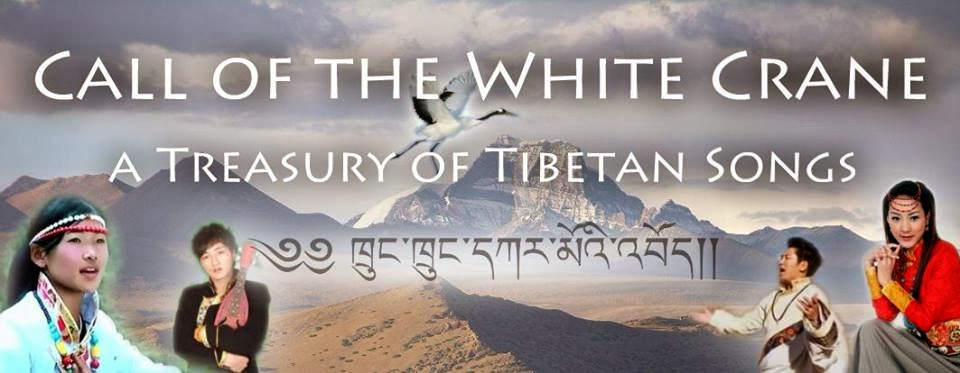བུ་མོ་སྒྲོལ་མ།
The Girl Named Drolma
ཚིག ཁྱང་པོ་དཔལ་རྒྱལ།
གདངས། ཞི་བདེ་ཉི་མ།
གླུ་བ། བཀྲ་ཤིས།
Lyrics: Khyangbo Palgyal
Music: Shide Nyima
Singer: Tashi
ཁྱོད་ཀྱི་མིང་ལ་བུ་མོ་སྒྲོལ་མོ་ཟེར།།
ང་ཡི་མིང་ལ་བུ་ཆུང་དོན་གྲུབ་ཟེར།།
ང་ཚོ་ཚང་མ་སློབ་གྲྭ་གཅིག་པ་རེད།།
ཁྱོད་ཀྱིས་མཐུན་སྒྲིལ་བྱོས།།
ང་ཡིས་ཧུར་བརྩོན་བྱེད།།
ང་ཚོ་ཚང་མ་ཁ་བ་རི་པའི་བུ་ཕྲུག་ཡིན།།
You are the girl named Drolma
And I the young boy named Dondrup.
We are from the same school.
Please be friendly and
I will strive to do my best.
We are both children of the snow mountains.
ཁྱོད་ནི་ཆོས་ལ་དད་པའི་བུ་མོ་རེད།།
ང་ནི་ཤེས་བྱར་དགའ་བའི་བུ་ཆུང་ཡིན།།
ང་ཚོ་ཚང་མའི་ཕུགས་བསམ་གཅིག་པ་རེད།།
ཁྱོད་ཀྱིས་མཐུན་སྒྲིལ་བྱོས།།
ང་ཡིས་ཧུར་བརྩོན་བྱེད།།
ང་ཚོ་ཚང་མ་མི་རིགས་བཟང་པོའི་རྒྱུད་པ་རེད།།
You are a girl who believes in the dharma.
And I the young boy who likes knowledge.
Our ideals and thinking are the same.
Please be friendly and
I will strive to do my best.
We are both of excellent family lineages.
ཁྱོད་ཀྱིས་ཨ་ཕའི་གསུང་ལ་ཉོན།།
ང་ཡིས་ཨ་ཕའི་བསླབ་བྱར་བརྩི།།
ང་ཚོ་ཚང་མ་རུས་ཁྲག་གཅིག་པ་རེད།།
ཁྱོད་ཀྱིས་མཐུན་སྒྲིལ་བྱོས།།
ང་ཡིས་ཧུར་བརྩོན་བྱེད།།
ང་ཚོ་ཚང་མ་ཕ་མ་བཟང་པོའི་བུ་ཕྲུག་ཡིན།།
You obey your mother and father.
And I value my parents' advice.
We are both from the same flesh and blood.
Please be friendly and
I will strive to do my best.
We are both children of excellent parents.
ཁྱོད་ཀྱི་མིང་ལ་བུ་མོ་སྒྲོལ་མོ་ཟེར།།
ང་ཡི་མིང་ལ་བུ་ཆུང་དོན་གྲུབ་ཟེར།།
ང་ཚོ་ཚང་མ་སློབ་གྲྭ་གཅིག་པ་རེད།།
ཁྱོད་ཀྱིས་མཐུན་སྒྲིལ་བྱོས།།
ང་ཡིས་ཧུར་བརྩོན་བྱེད།།
ང་ཚོ་ཚང་མ་ཁ་བ་རི་པའི་བུ་ཕྲུག་ཡིན།།
ཁྱོད་ཀྱིས་མཐུན་སྒྲིལ་བྱོས།།
ང་ཡིས་ཧུར་བརྩོན་བྱེད།།
ང་ཚོ་ཚང་མ་ཁ་བ་རི་པའི་བུ་ཕྲུག་ཡིན།།
You are the girl named Drolma
And I the young boy named Dondrup.
We are from the same school.
Please be friendly and
I will strive to do my best.
We are both children of the snow mountains.
Please be friendly and
I will strive to do my best.
We are both children of the snow mountains.
Notes:
I was inspired to translate this song after a long
conversation about Tibetan music with an Ani. Lamenting the days when Tibetan
songs all had deep, profound lyrics, she remarked how the majority of modern
songs make use of very superficial lyrics. I agreed but then showed her a few
modern songs with very beautiful lyrics, restoring her faith in Tibetan music.
This translation is a tribute to that conversation as it is the classical “I’m
a boy, you’re a girl, you look nice, and so…” Not to demean the song or singer
in anyway (Tashi indeed has lots of great songs!) it is certainly a very catchy
and pleasant modern song. Please enjoy!
-Lobsang
